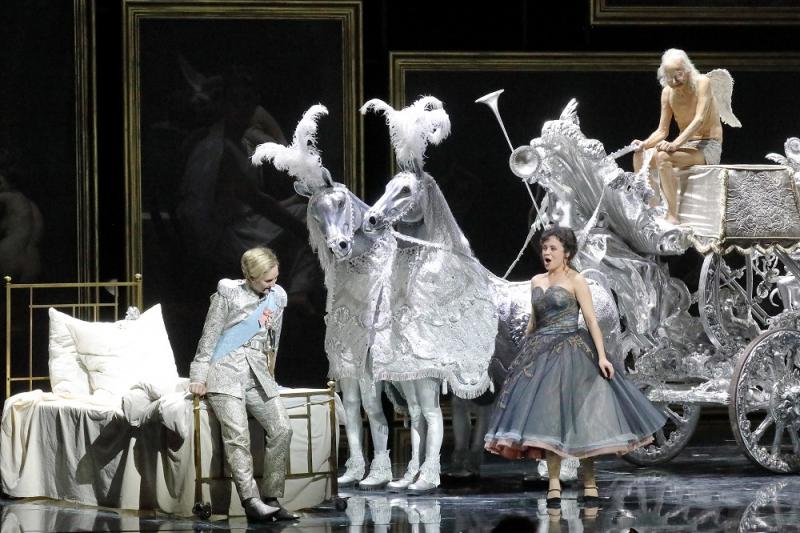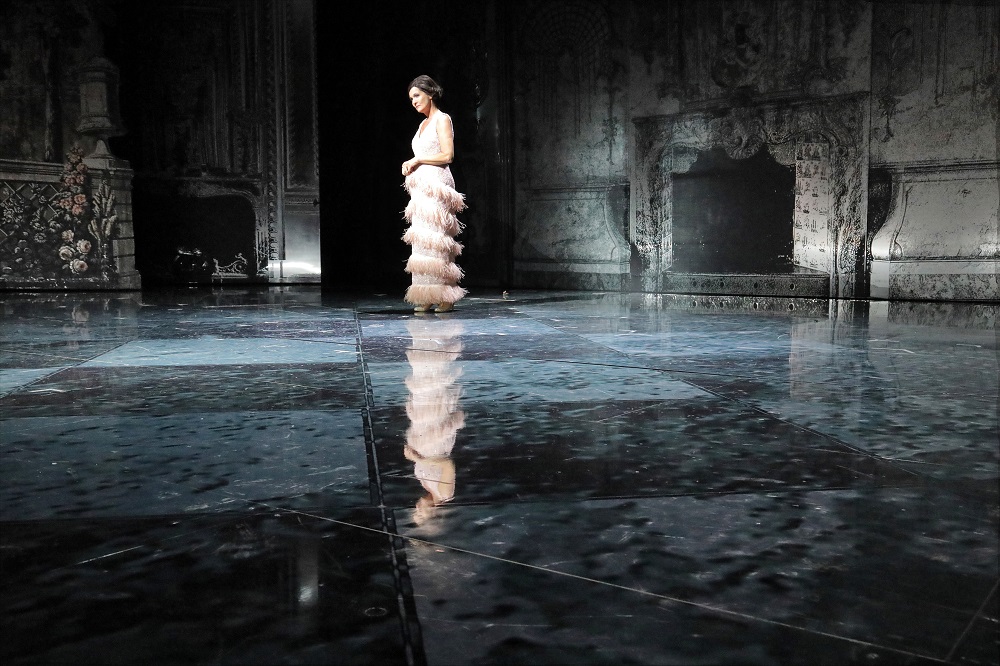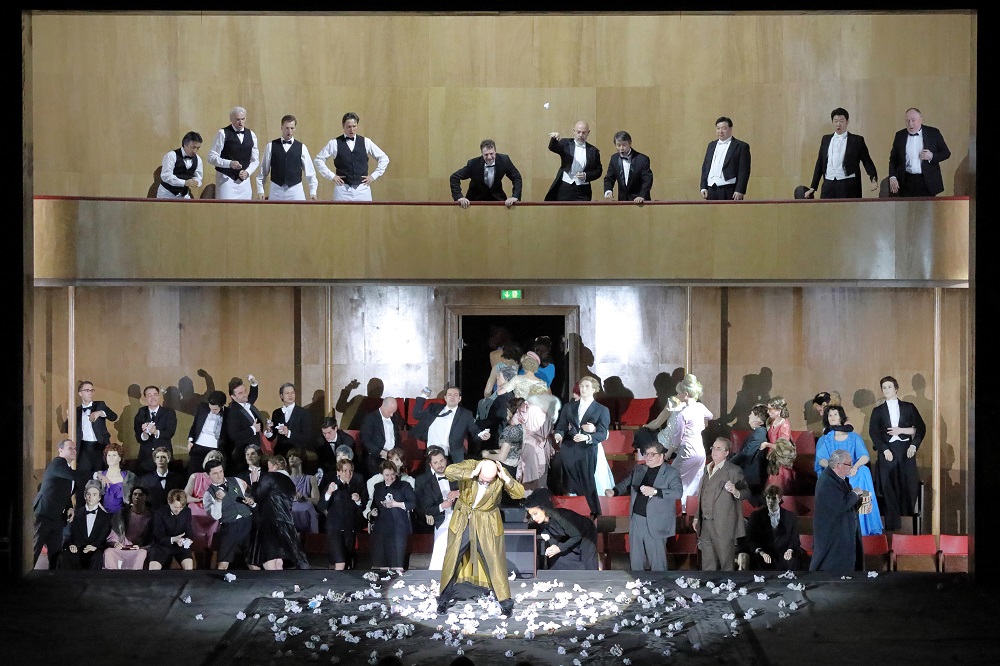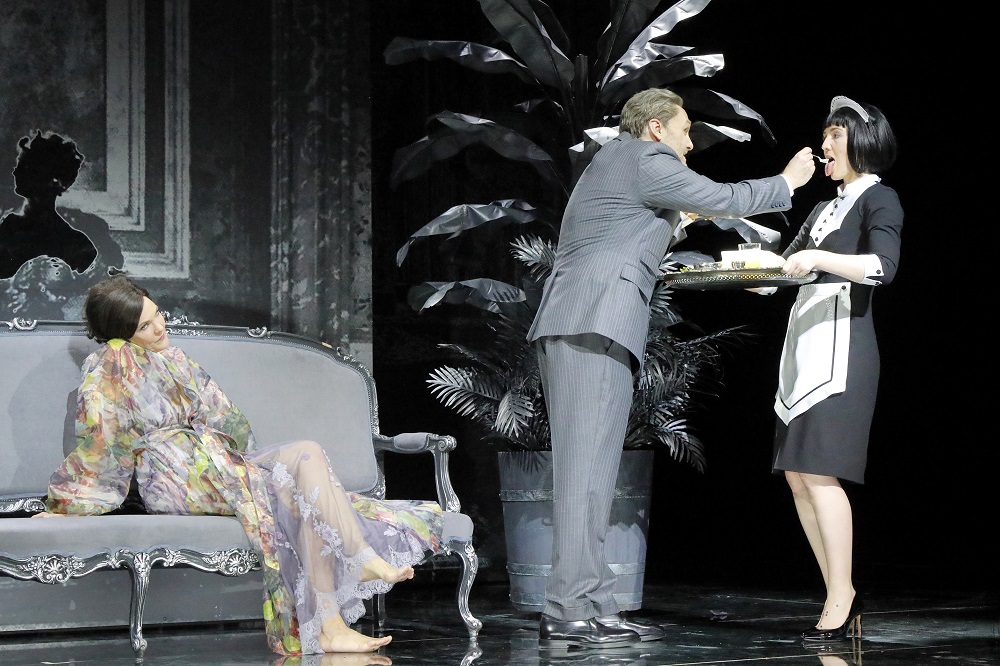Der Rosenkavalier, Bavarian State Opera online review - myth-making magic | reviews, news & interviews
Der Rosenkavalier, Bavarian State Opera online review - myth-making magic
Der Rosenkavalier, Bavarian State Opera online review - myth-making magic
A superb cast brings to life Barrie Kosky's vivid Strauss/Hofmannsthal reinterpretation

Venus, Cupid, Folly and Time stalk this haunting dream of a Rosenkavalier. The love games of teenager Octavian and his experienced mistress the Marschallin are sexy and plausible; the comedy of ridiculous Baron Ochs keeps a low profile, but stays real and turns out funny in unexpected places; a winged old gentleman (Ingmar Thilo) embodies the second and fourth manifestations.
The context could hardly be classier. Was it for social distancing’s sake that Strauss’s opulent score is much reduced in the currently-ubiquitous Eberhard Kloke's reduction for 38 players? An argument is made for more transparency, better interplay with the stage. There are some annoyances – why the piano intruding in the Marschallin’s remembrance of times past when the chamber ensemble is already there? Why that nasty thickening instrument the harmonium, fallback of early 20th century reductions? There are enough players not to warrant it. But with Vladimir Jurowski in command, the textures still glisten and woodwind colours emerge more vividly than usual (superb bass clarinet), while the pace has none of the sentimental slowings which too often bedevil contemporary interpretations. Jurowski also allows the singers, Marlis Petersen’s intelligent and beautiful Marschallin especially (pictured above) to energise the text even in what we think of as the set-pieces. And what knocked me for six is that the music is absolutely complete, with none of those fussy cuts which are common to nearly every opera house in the world, and which often have the paradoxical effect of making the third act especially seem longer.
Jurowski also allows the singers, Marlis Petersen’s intelligent and beautiful Marschallin especially (pictured above) to energise the text even in what we think of as the set-pieces. And what knocked me for six is that the music is absolutely complete, with none of those fussy cuts which are common to nearly every opera house in the world, and which often have the paradoxical effect of making the third act especially seem longer.
What Kosky gets his performers to do justifies each opening-up. Ochs’s long monologue of his repellent amatory achievements in Act One holds up with fine articulation and a remarkable bass voice, secure at both bottom and heights of the range, in the rather handsome personage of Christof Fischesser. The early business with Octavian dressed up as a very forward chamber maid is low level, not especially funny, but not embarrassing or unreal either. The real comedy can develop in Act Three, a “Viennese masquerade” more stagey than even Strauss and Hofmannsthal would have imagined, with a full auditorium to look out on beyond the stage-within-a-stage (Kosky achieves a coup with it in Ochs’s final humiliation, pictured below).  Each act has a completely different look, unforgettable in the sets of Rufus Didwiszus, Victoria Behr's costumes and Alessandro Carletti's lighting, and a different summons: grandfather clock in Act One (the face goes whizzing off during the Prelude which parodies the lovemaking of Octavian and the Marschallin); an alarm for Sophie to get out of bed and be married off to a man she hasn’t met (she falls for the “rose-bearer” Octavian instead, of course); and a cuckoo clock for the more rusticated Act Three farce. The tarnished silver of Act One has various “stages” whizzed across it: a baffling magic garden when the original libretto has the Marschallin’s page-boy brings in the breakfast, little Cupids on pillars, a full-colour Louis XIV panorama for the Italian tenor (Galeano Salas, superb).
Each act has a completely different look, unforgettable in the sets of Rufus Didwiszus, Victoria Behr's costumes and Alessandro Carletti's lighting, and a different summons: grandfather clock in Act One (the face goes whizzing off during the Prelude which parodies the lovemaking of Octavian and the Marschallin); an alarm for Sophie to get out of bed and be married off to a man she hasn’t met (she falls for the “rose-bearer” Octavian instead, of course); and a cuckoo clock for the more rusticated Act Three farce. The tarnished silver of Act One has various “stages” whizzed across it: a baffling magic garden when the original libretto has the Marschallin’s page-boy brings in the breakfast, little Cupids on pillars, a full-colour Louis XIV panorama for the Italian tenor (Galeano Salas, superb).
Yett Kosky knows to leave well alone in the superbly staged one-to-one of Octavian dealing with the Marschallin’s changed mood in the great final scene here: kneeling confidences, rejections, back to back – all charting the mood of great music theate. Samantha Hankey is as handsome and convincing an Octavian as any I’ve seen, providing what Kosky calls that Ovid-Metamorphoses frisson of sexy boy-girl (pictured below right as Mariandel in Act 1, with Petersen and Fischesser). Petersen is pure class from start to finish. I can hear people saying already, what about the aristocratic side? But Kosky has shed all the class issues.  So we move on not to a nouveau-riche palace with windows for all the street to gape in on Faninal’s acquired wealth, but a picture gallery of Cupids and classical amatory adventures. At several points a bacchanal or Poussinesque dance to the music of time comes to life, replacing the usual pursuit of maidservants by Ochs’s retinue, and besuited men sprout horns - a play on Pan-ic?). Time/Cupid drives the coach for a properly splendid Presentation of the Rose; Katharina Konradi‘s Sophie is both spirited and virginal, though quickly succumbing to a passionate kiss, and exquisite in the hgh-flying lines. The new scenario shouldn’t work, but it does, thanks to the fine-tuned detail as well as the quirky characterisations of Johannes Martin Kränzle's Faninal, Wolfgang Ablinger-Sperrhacke's Valzacchi and Ursula Hesse von den Steinen's Annina. There's not the huge gallery of characters Richard Jones gave us in his equally inventive Glyndebourne Rosenkavalier, but it all works at the same high level of choreographed perfection.
So we move on not to a nouveau-riche palace with windows for all the street to gape in on Faninal’s acquired wealth, but a picture gallery of Cupids and classical amatory adventures. At several points a bacchanal or Poussinesque dance to the music of time comes to life, replacing the usual pursuit of maidservants by Ochs’s retinue, and besuited men sprout horns - a play on Pan-ic?). Time/Cupid drives the coach for a properly splendid Presentation of the Rose; Katharina Konradi‘s Sophie is both spirited and virginal, though quickly succumbing to a passionate kiss, and exquisite in the hgh-flying lines. The new scenario shouldn’t work, but it does, thanks to the fine-tuned detail as well as the quirky characterisations of Johannes Martin Kränzle's Faninal, Wolfgang Ablinger-Sperrhacke's Valzacchi and Ursula Hesse von den Steinen's Annina. There's not the huge gallery of characters Richard Jones gave us in his equally inventive Glyndebourne Rosenkavalier, but it all works at the same high level of choreographed perfection.
Our ancient Cupid is still hovering around the more realistic set-up of Ochs’s assignation with “Mariandel” – sitting in the stalls on the stage, in the prompt box, at one point returning against a stage freeze and a bit of usually discarded orchestral interlude music to drop Ochs’s discarded and much-missed toupee on the floor (I laughed out loud at that bit), finally atop the grandfather clock. Nor does the usual magic fail to materialize in the great final scene, trio and duet: with three such radiant voices as Petersen’s, Hankey’s and Konradi's, how could it? You have a month to view this on Arte for free; I’ll be returning at least one more time, grateful for such an amazing achievement in difficult times as Germany retrenches again.
The future of Arts Journalism
You can stop theartsdesk.com closing!
We urgently need financing to survive. Our fundraising drive has thus far raised £49,000 but we need to reach £100,000 or we will be forced to close. Please contribute here: https://gofund.me/c3f6033d
And if you can forward this information to anyone who might assist, we’d be grateful.

Subscribe to theartsdesk.com
Thank you for continuing to read our work on theartsdesk.com. For unlimited access to every article in its entirety, including our archive of more than 15,000 pieces, we're asking for £5 per month or £40 per year. We feel it's a very good deal, and hope you do too.
To take a subscription now simply click here.
And if you're looking for that extra gift for a friend or family member, why not treat them to a theartsdesk.com gift subscription?
more Opera
 Carmen, English National Opera review - not quite dangerous
Hopes for Niamh O’Sullivan only partly fulfilled, though much good singing throughout
Carmen, English National Opera review - not quite dangerous
Hopes for Niamh O’Sullivan only partly fulfilled, though much good singing throughout
 Giustino, Linbury Theatre review - a stylish account of a slight opera
Gods, mortals and monsters do battle in Handel's charming drama
Giustino, Linbury Theatre review - a stylish account of a slight opera
Gods, mortals and monsters do battle in Handel's charming drama
 Susanna, Opera North review - hybrid staging of a Handel oratorio
Dance and signing complement outstanding singing in a story of virtue rewarded
Susanna, Opera North review - hybrid staging of a Handel oratorio
Dance and signing complement outstanding singing in a story of virtue rewarded
 Ariodante, Opéra Garnier, Paris review - a blast of Baroque beauty
A near-perfect night at the opera
Ariodante, Opéra Garnier, Paris review - a blast of Baroque beauty
A near-perfect night at the opera
 Cinderella/La Cenerentola, English National Opera review - the truth behind the tinsel
Appealing performances cut through hyperactive stagecraft
Cinderella/La Cenerentola, English National Opera review - the truth behind the tinsel
Appealing performances cut through hyperactive stagecraft
 Tosca, Royal Opera review - Ailyn Pérez steps in as the most vivid of divas
Jakub Hrůša’s multicoloured Puccini last night found a soprano to match
Tosca, Royal Opera review - Ailyn Pérez steps in as the most vivid of divas
Jakub Hrůša’s multicoloured Puccini last night found a soprano to match
 Tosca, Welsh National Opera review - a great company reduced to brilliance
The old warhorse made special by the basics
Tosca, Welsh National Opera review - a great company reduced to brilliance
The old warhorse made special by the basics
 BBC Proms: The Marriage of Figaro, Glyndebourne Festival review - merriment and menace
Strong Proms transfer for a robust and affecting show
BBC Proms: The Marriage of Figaro, Glyndebourne Festival review - merriment and menace
Strong Proms transfer for a robust and affecting show
 BBC Proms: Suor Angelica, LSO, Pappano review - earthly passion, heavenly grief
A Sister to remember blesses Puccini's convent tragedy
BBC Proms: Suor Angelica, LSO, Pappano review - earthly passion, heavenly grief
A Sister to remember blesses Puccini's convent tragedy
 Orpheus and Eurydice, Opera Queensland/SCO, Edinburgh International Festival 2025 review - dazzling, but distracting
Eye-popping acrobatics don’t always assist in Gluck’s quest for operatic truth
Orpheus and Eurydice, Opera Queensland/SCO, Edinburgh International Festival 2025 review - dazzling, but distracting
Eye-popping acrobatics don’t always assist in Gluck’s quest for operatic truth
 MARS, Irish National Opera review - silly space oddity with fun stretches
Cast, orchestra and production give Jennifer Walshe’s bold collage their all
MARS, Irish National Opera review - silly space oddity with fun stretches
Cast, orchestra and production give Jennifer Walshe’s bold collage their all
 Káťa Kabanová, Glyndebourne review - emotional concentration in a salle modulable
Janáček superbly done through or in spite of the symbolism
Káťa Kabanová, Glyndebourne review - emotional concentration in a salle modulable
Janáček superbly done through or in spite of the symbolism

Add comment